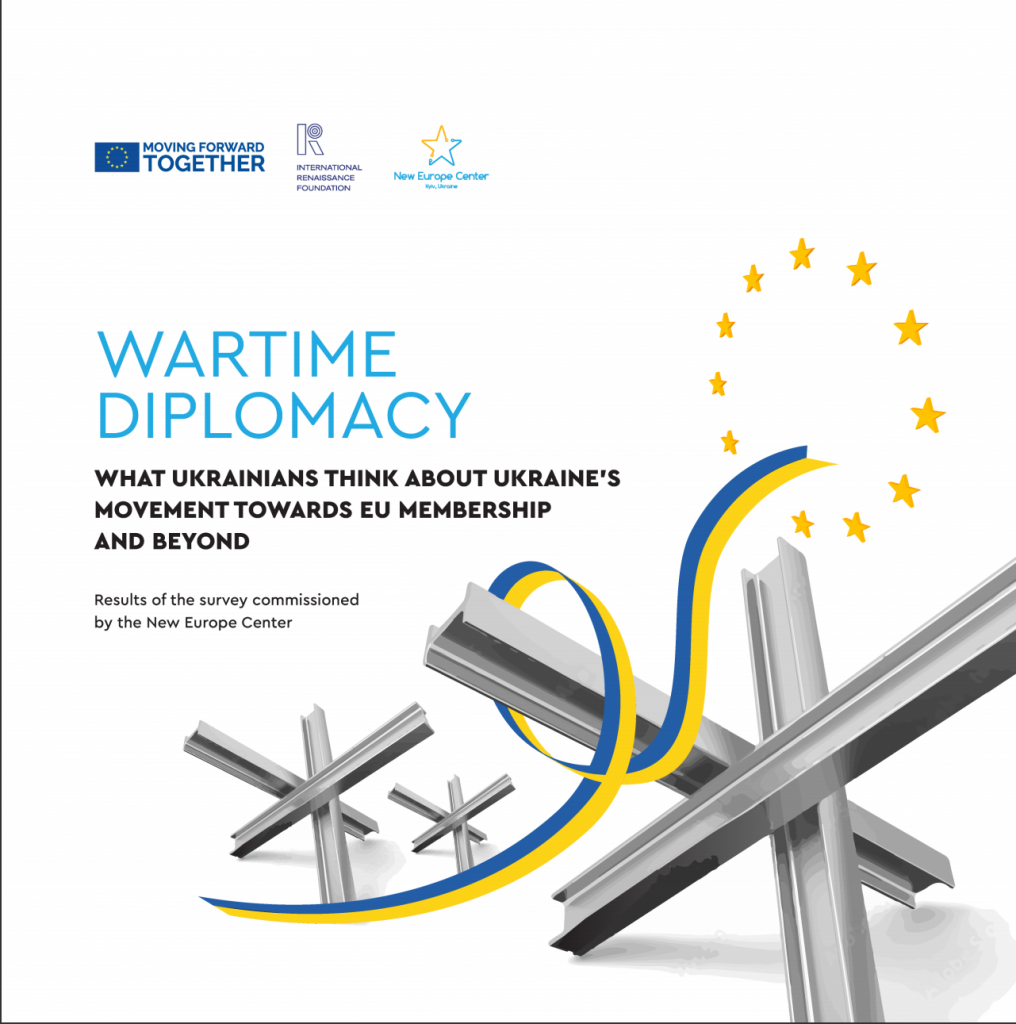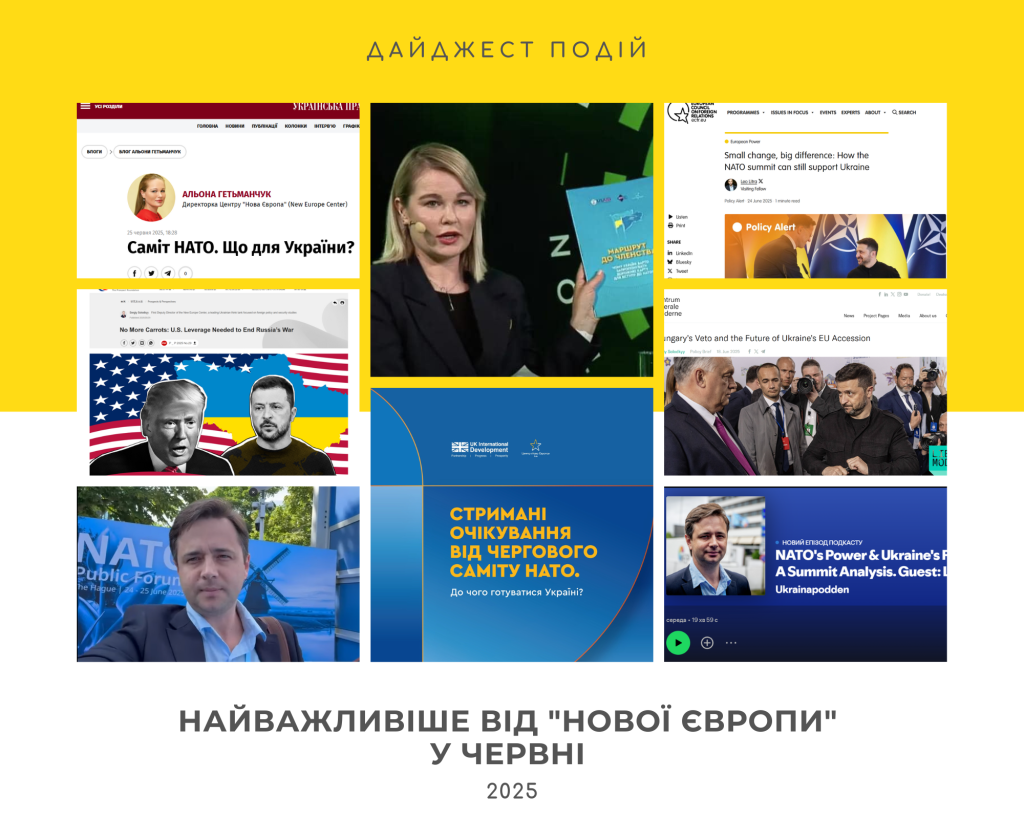
Сommissioned by the New Europe Center INFO SAPIENS LLC conducted the study, in which the opinions of Ukrainians regarding Ukraine’s movement to the EU during the war were analyzed, in particular:
- Why was Ukraine granted EU candidate status?
- EU accession negotiations before the end of the war
- Is it right that the EU has set requirements for Ukraine to implement reforms needed for opening accession negotiations?
- When will Ukraine become a member of the EU?
- What do you feel when EU representatives point out corruption in Ukraine?
- Approximation of Ukrainian law to the EU acquis communautaire
-
Peace negotiations with Russia: refusal of Ukraine’s accession to NATO in exchange for the withdrawal of Russian troops from the occupied territories
-
The level of trust to foreign politicians
-
The level of trust to international organizations/associations
Read the results of the survey via the following link.
Key findings:
- The secret of successful European integration is reforms. Ukrainians realize that reforms and implementation of the best European standards are the central element of the country’s integration into the EU. Almost 40% of citizens believe that Ukraine was granted the EU candidate status, in particular, due to the progress in this sphere — the implemented reforms. This is not the first time that Ukrainians have demonstrated foresight and commitment to reforms — responding to the New Europe Center survey in 2021, 67% of citizens noted that it is important for Ukraine to continue pro-European reforms, even if the EU does not grant the country a membership perspective.
- Most Ukrainians believe that the EU’s reform requirements for Ukraine are right. Now as Ukraine has gained a European perspective and candidate status, Ukrainians do not want to stop there — 73% of citizens believe it is right that the EU has set requirements for Ukraine to implement reforms needed for opening accession negotiations. And while some of the respondents note that the EU should be more lenient towards Ukraine in the issue of reforms because of the war, 47% confidently state that reforms are in the interests of Ukraine itself and the EU should demand their implementation as soon as possible. In particular, anti-corruption reform is important — more than half of the population (60.1%) support the pressure from the EU on Ukraine to tackle corruption. Only 19.5% of respondents say that it is not currently the main problem in Ukraine.
- Quality of laws is more important than speed in the EU accession process. Most Ukrainians are aware that the quality of reforms implementation is more important than its speed: 59% of citizens say that in order to approximate Ukraine’s law in line with EU acquis communautaire, Ukrainian government needs to prepare all the necessary laws as best as possible and hold all the necessary discussions, even if it takes a long time. The opinion that the laws should be adopted as soon as possible, even if they will have to be revised later, is supported by only one third of the population — 36%.
- War is not an obstacle for European progress. Ukrainians are optimistic about Ukraine’s further progress towards EU membership despite the war — 62% of respondents believe that Ukraine will be able to start EU accession negotiations before the war ends. 20% of respondents do not believe in this possibility.
- Ukrainians see the country in the EU in the near future. Ukrainians can be called Euro-optimists — the majority of citizens believe that Ukraine will become a member of the EU in the short or medium term: 55% of Ukrainians believe that this will happen in the next 1-5 years. 27% prefer not to name a particular time frame, optimistically choosing the option «as soon as the war is over». Only 6% of citizens believe that Ukraine will join the EU in the next 10 years.
- Joining NATO cannot be a bargaining chip. In October this year, a record level of support for Ukraine’s accession to NATO was recorded in Ukraine — 83%2 . We decided to ask Ukrainians how conscious and sustainable this choice is. In March 2022, Ukraine considered the possibility of starting peace talks with Russia, offering to refuse Ukraine’s accession to NATO in exchange for the withdrawal of Russian troops from the occupied territories of Ukraine. More than two-thirds of Ukrainians (69%) do not consider it possible to start peace talks on such conditions.
- Andrzej Duda is the most trusted leader. The President of Poland has been winning over public opinion in Ukraine for the second year in a row — 87% of citizens trust him (compared to 52% in 2021). US President Joseph Biden (79%) and European Commission President Ursula von der Leyen (73%) rank second and third respectively. In general, there is a significant increase in trust to foreign leaders compared to 2021. At the same time, it can be assumed that the top three leaders could be slightly displaced by former British Prime Minister Boris Johnson, who Ukrainians respect a lot. It is noteworthy, however, that the new head of the British government, Rishi Sunak, ranks fourth — 64% of Ukrainians trust him. These data may indicate that Ukrainians are aware that support for Ukraine in the face of a full-scale invasion is provided by the states, and not personally by their leaders. Therefore, the UK will remain a friend to Ukraine, regardless of who heads the government.
- Ukrainians do not trust the aggressor and his henchmen. Putin and Lukashenko are the foreign leaders that Ukrainians distrust the most for the second year in a row — 97% and 94% of respondents. A large proportion of Ukrainians also distrust Xi Jinping (73%) and Viktor Orban (69%) — compared to 2021, distrust of these leaders has tripled. Ukrainians also began to trust Recep Tayyip Erdogan less (the level of distrust increased by 27%) and Emmanuel Macron (by 14%). In 2022, the level of trust to foreign leaders depends on what statements these leaders make about the Russian-Ukrainian war and what assistance their countries provide.
- The EU is the leader of Ukrainians’ sympathies. Among all international organizations and associations, Ukrainians trust the EU the most — 84% of citizens. Probably, this is due to the fact that in addition to economic and humanitarian assistance, the EU has also shown leadership in the field of security and defense: the provision of weapons to Ukraine is carried out through the European Peace Facility, it was the EU that launched a military training mission for the Ukrainian armed forces, etc. At the same time, Ukrainians believe that this sympathy and trust are mutual: 23% of Ukrainians believe that Ukraine received candidate status this summer because the EU needs Ukraine, and 39% believe that it happened due to the reforms implemented. NATO (76%) and G7 (71%) are also in the top three of Ukrainian sympathies.
This publication has been produced with the EU support, within the EU-funded EU4USociety project implemented by the International Renaissance Foundation. The views and interpretations expressed in this publication are the authors’ and do not necessarily reflect those of the EU, EU4USociety and IRF.














